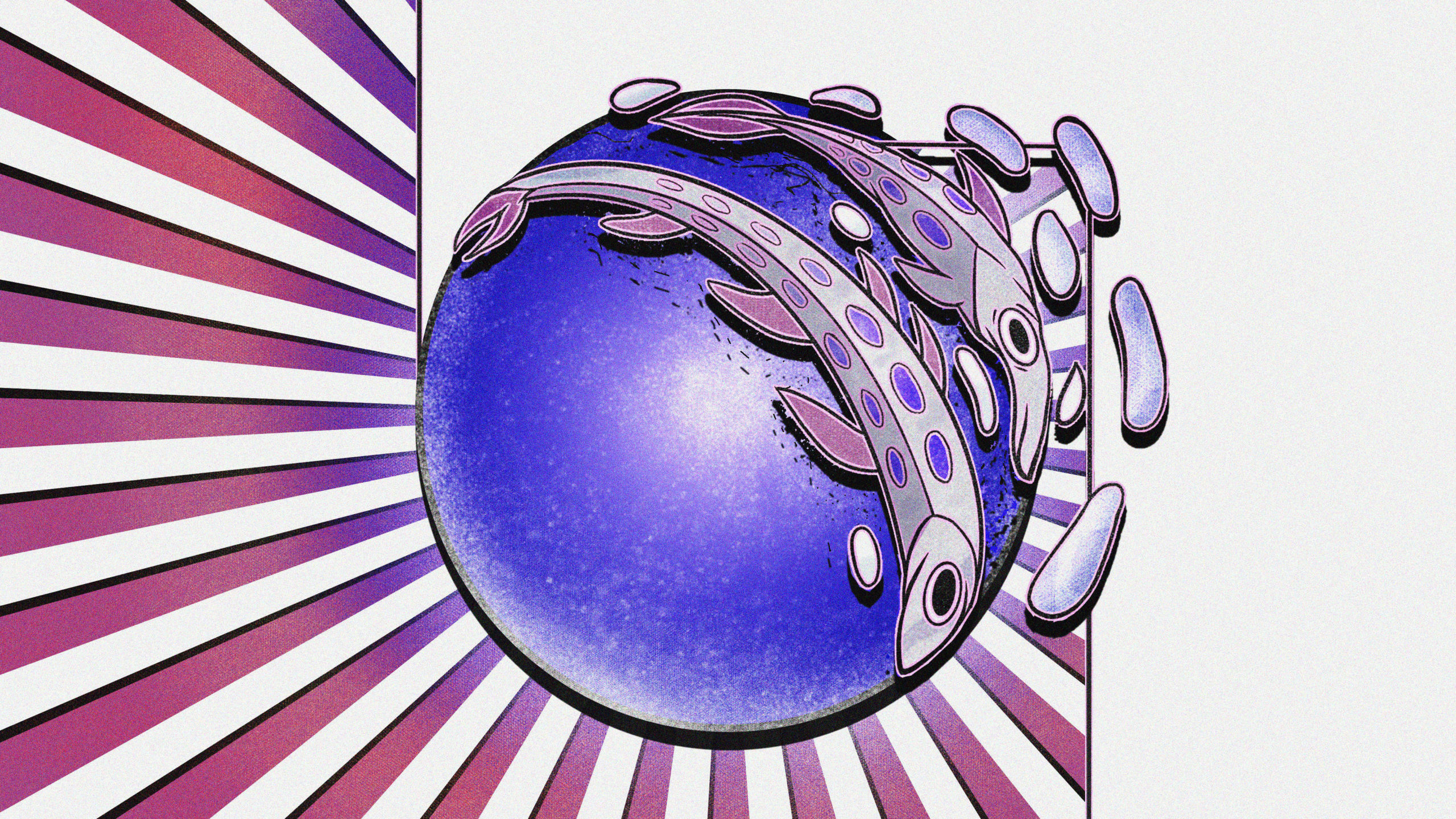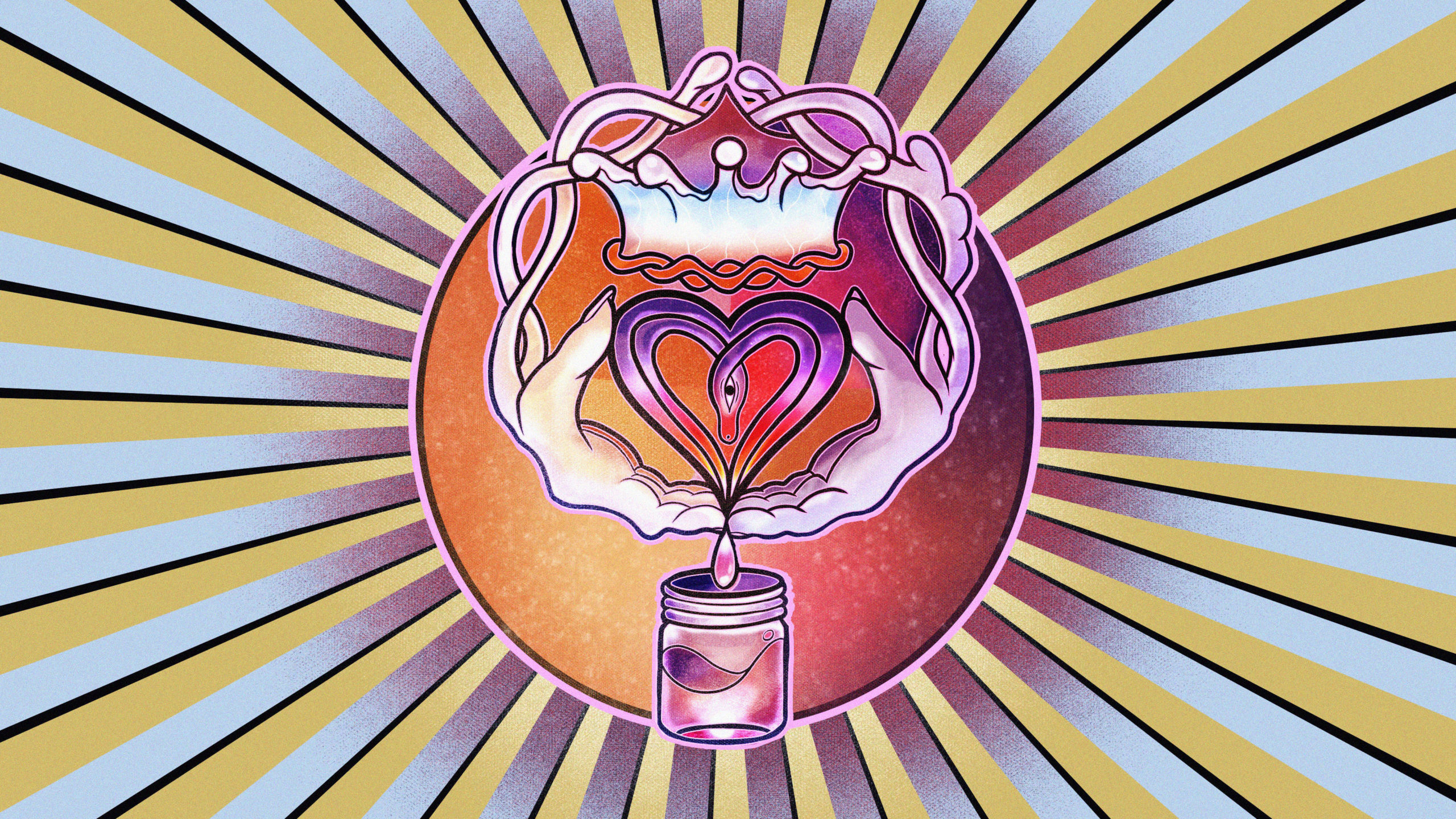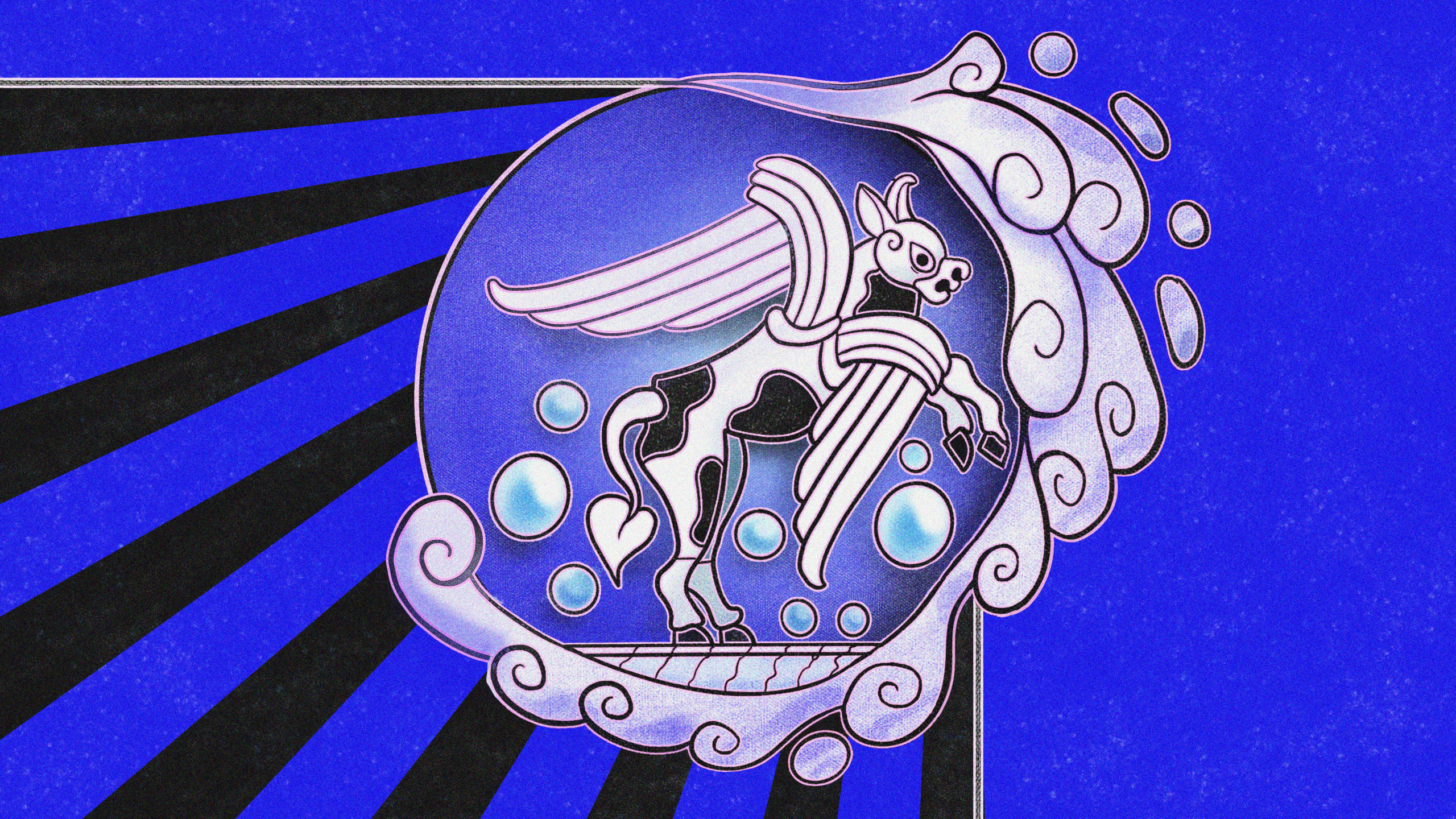Thinking Outside the Bin: Getting creative about food waste
Illustrations for this piece come courtesy of Cesca Saunders.
Cesca was reminded of how often she has seen the concept of circular economy ‘reduced to simple diagrams
that don’t capture the ‘blindingly beautiful golden loop of closed circle economies’.
‘And what other diagrams have this kind of joy?’ Cesca asks, ‘Well, Old Celtic annual wheels of course!’
Words: Caitriona Devery
Illustrations: Cesca Saunders
One million tonnes of food is wasted every year in Ireland. Fingers are often pointed at feckless customers stuffing trolleys far beyond what they will actually use. But waste happens at all stages in the food chain and household bins only tell part of the story. There is a colossal system built around overproduction of cheap food. At multiple levels, whether retail, hospitality or the home, waste is often seen as an inevitable consequence.
The industrial farming underlying the global food system plunders precariously finite natural resources like soil and water and threatens biodiversity. Greenhouse gas emissions from agriculture are one of the major causes of global warming, which is biting back in a big way as farming is impacted by climate change.
In lower-income countries food loss happens more in the early stages of the food chain, in industrialised countries more food is wasted at the consumer stage. The problem comes hand in hand with the ‘luxuries’ of supermarkets and cheap food. In 1980 Irish households spent 28% of their income on food, now it’s less than 15%. We spend less and waste more. As the world’s population grows and countries become richer, how can we reduce the impact of our appetites on the planet?
Professor Nick Holden from UCD has researched waste in the food system. The most effective solution is a simple one: avoidance.
He says, “Once you’ve ‘spent’ the resource and you’ve made the food, there is nothing you can do with the food product to offset that ‘spend’. The impact has happened, you’ve caused all the emissions, consumed the resources”. There are innovations which will help avoid waste in supply chains, like the Internet of Food Things which uses digitalisation to match production to demand. In the home, smart fridges and apps will automate how we shop. Technology will help, but it’s not a quick fix. Avoiding waste requires a systemic and cultural shift.
This will involve a transition to a circular economy. Circular economy is production and consumption based on reusing and recycling rather than linear resource exploitation and addiction to continuous growth. It means adapting the infrastructure of how we produce, distribute and reuse food. In this article, I speak to people trying to fix the system on a local scale; developing new communities and local markets, while dealing with surplus in old and new ways. All over Ireland, people are coming up with creative ways to create a sustainable food system.

Reinvention of Retail
The new grocery shops, delis and online independent retail infrastructure that are emerging in this hugely challenging environment may change how we buy food, and how we value it.
The pandemic has been rough for the food sector. Food itself, however, has played a starring role. Cooking was a coping mechanism for many over the past months. My Instagram has been full of isolation kimchi, sourdough, banana bread, people growing tomatoes and making stuff from scratch. I personally went through a margarita phase that gave me great solace. There’s lots of experimentation with new ingredients, often Irish. Going local means shorter routes from farm to fork, which is an obvious win for waste and the environment.
Covid has forced a reinvention of food retail. Food boxes, DIY food kits, and the new wave of restaurants-turned-grocers such as the Fumbally, Forest Avenue and Host are helping home cooks fill the restaurant shaped hole in our hearts. Obviously, supermarkets are an essential part of our food ecosystem. Market-style shopping and craft products often cost more. But it is an interesting time for food in Ireland, and the new grocery shops, delis and online independent retail infrastructure that are emerging in this hugely challenging environment may change how we buy food, and how we value it.
Much retail has gone online. I’ve developed a Pavlovian response to the doorbell; packages arrive like little presents from my past self. In an act of apparent clairvoyance, Chris Chapman had the idea to start an online grocery service in January with his pal Verbena, taking a break from running his Open Ear music festival on Sherkin Island. Weekl.ie is an online market-style shop working with sustainable and largely Irish food producers like McLoughlin’s butchers, Tartine and Sustainable Seafood Ireland. Yet while the food miles are important, they’re not Irish absolutists, also stocking Imbibe coffee, Sarah & Olive single estate olive oils, Mediterranean goodies from Lilliput and lots more. They recently launched an Essentials milkman-type service for everyday groceries with the option to add in extras.
Weekl.ie act as an intermediary between local producers and customers, playing an active role in mediating supply and demand. It’s in everyone’s interest for this to be as efficient as possible. Perishable fruit, vegetables, meat and fish are the most difficult stock to manage. Chris says there’s a speculative element to food production and retail, “someone has to hold the stock, whether that’s the farmer or the retailer, someone is taking the risk”. For instance, they get their chicken from Regan organic chicken farm, who slaughter to order once a week. They ask customers for notice but still have to forecast demand to some degree. Mostly, Chris says, they get it right.
The scale they work at allows them to come up with creative answers to nature’s seasonal variability, which Chris says has been a learning curve. Strong relationships with their growers is vital. When something is abundant, Weekl.ie promote it, as they did with Wicklow rhubarb and tomatillos over the summer. This human scale community of producers and suppliers makes it easier to work together to avoid waste. They have a delicious circular economy loop with Portuguese café Alma;who turn their excess milk stock into silky dulce de leche. Their dream is an onsite Weekl.ie kitchen where they could create their own products like compotes and chutneys from past-sell date or imperfect fruit and veg.

Fermentation
I just tried to offer a service to people, as I thought of all this incredible produce rotting due to lack of demand. I was interested in the potential to not only help farms and growers but to further instil fermentation within our food culture
Cuan Greene
Weekl.ie is a great example of the power of online working in tandem with local food communities. Social media also helped with supply chain disruptions during lockdowns. Niall Sabongi of Sustainable Seafood Ireland was left with €30,000 of perishable stock meant for restaurants in September when Dublin abruptly went into level 3. Twitter and Instagram got the message out and much of the fish was sold at markets over that weekend. Chef Cúán Greene also used his socials to help with Covid surplus. No longer at Bastible, Cúán has been working on dreamy food collaborations and hanging out with Irish makers while developing his own project, Ómós. Earlier in the year he reached out online to offer the fermentation expertise he honed at Denmark’s famous Noma restaurant to growers with surplus produce due to lockdown.
Cúán explained, “I just tried to offer a service to people, as I thought of all this incredible produce rotting due to lack of demand. I was interested in the potential to not only help farms and growers but to further instil fermentation within our food culture”. He gave the ferments back to the farms to sell later. He worked closely with Ryan’s rhubarb growers based in Oldtown, Co. Dublin. Cúán said, “A lot of people think rhubarb is a fruit, but it’s actually a vegetable, and fermenting it transforms it into an incredible ingredient”.
We spoke about the reinvention of his trade over the last few months and the new pop-up groceries. He says, “Take the Fumbally in Dublin 8, they’re converting to a grocery, they see the potential there. It’s a change of lifestyle from hectic cafe culture, which is a massive undertaking, huge volumes and relatively small returns. It can be a better way of life, where you give more to the community, take more from farms.”
Fermentation and community are part of the sustainability arsenal of 4 Hands Studio, run by couple Rose Greene and Margaux Dejardin, on their farm in County Westmeath. Like Cúán, Rose has a background in high end kitchens and cheffed at Michelin-starred In De Wulf in Belgium. Pre-Covid they were doing pop up and food collaborations. Their main business these days is naturally fermented food and drinks. Their approach is based on relationships and working with nature.
Rose says, “A major aspect of our business is maximising produce from the outset and waste reduction is built into this. For our vegetable ferment products we work hard to get produce in peak condition in its most nutrient dense, we have built relationships with producers in order to do this, we also help use produce in excess from them. So generally we get the produce before it gets into the supply chain, I think a major aspect of waste is overproduction, as people and most businesses are used to having everything at hand and don’t plan ahead”.
Being part of a community means they find out about potential waste so can create circular economies.. She says, “We have taken onions from a local growers who had planned to have them as stored onions, but they got a disease which meant they would not store very long, we bought them and fermented them before they got the time to degrade. We work with another grower who ‘lost’ a bed of carrots as they didn’t get a chance to weed them, we offered to buy them for our probiotic juice products. We use tallow from a local organic beef producer, rendering it, and making it into soap.”

Working with Byproducts
Large organisations or producers build in a certain amount of waste into their calculations, whether it is vegetables left in the ground after harvest, veg that is not the ‘right’ size, or the waste that consumers generate in their homes.
Rose, 4 Hands
When I spoke to Professor Nick Holden, he stressed a distinction when talking about food leftovers. “Wasted food is stuff that was grown to be eaten and wasn’t. Residues are things like potato peels or banana skins, stalks and so on”. Food waste or loss is avoidable, the residues are a byproduct of making something else. There are some great circular economy innovations happening all over Ireland at the moment as people seek to make the most of byproducts.
With this in mind, I finally spoke to a company at the cutting edge of sustainable food technology. Biasol is a new company set up by brother and sister Niamh and Rory Dooley. Niamh’s course in Food Science in University of Limerick made her aware of the need for a sustainable way to feed the growing global population, as did time spent in Vancouver, where green ways of living are embedded into the city. When her job as a Food Dudes ambassador was grounded because of Covid, she got to work with Rory on developing a sustainable food business.
After initial exploration of edible insects and coffee, they finally focussed on spent grains from the brewing process, which they turn into flour. Niamh used her food science skills to develop the product at the Ferbane Food Campus in Offaly, a food grade kitchen space for small businesses. They’re in the Supervalu Food Academy programme, hitting shelves in May next year.
They currently work with three breweries; St Mel’s in Longford, Ballykilcavan in Laois and BRÚ in Meath. The malty, dense flour is high in fibre, protein, low in sugars, which means it is perfect for brownies on its own and other baking can be mixed fifty-fifty with regular flour. Their goal is retail and also wholesale to restaurants, hoping to appeal to places like Loam and Aimsir that champion Irish ingredients.
This is the kind of joined-up innovation needed to create a circular and sustainable food system. Niamh says, “we want this to have a ripple effect and be an example of what can be done. When it comes to sustainability there can be so much in it that people can feel totally overwhelmed, that’s why we wanted just to look at this kind of circular economy idea for food. People going back to basics, community systems. This seems to be the way forward”.
This is echoed by Rose from 4 Hands, who lays the blame at the door of industrial scale agriculture. She says, “large organisations or producers built in a certain amount of waste into their calculations, whether it is vegetables left in the ground after harvest, veg that is not the ‘right’ size or the waste that consumers generate in their homes. Small producers need that local support, as they work more hands on, every little bit counts. A major change in our food system is needed”. How do we make the transition to food system sustainability? From chatting to these innovators it seems the answers lie in all the C’s: circular economy, community, collaboration and creativity. And customers, lots of customers.
Resources

